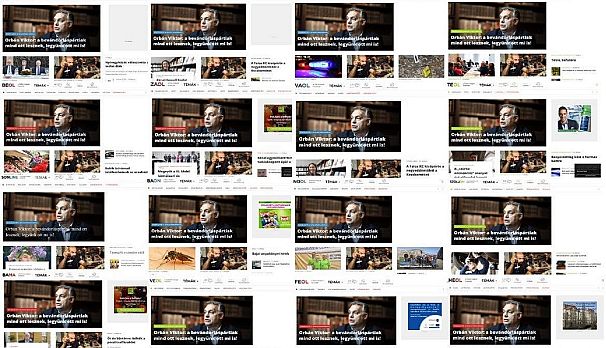Over the past nine years, public affairs have gradually become the private affairs of people with power, and every relevant law, regulation and practice echoes this shift in perspective. Government officials and politicians treat journalists asking them questions as if we were invading their privacy
About four weeks ago, László Kövér, an influential member of Hungary’s governing Fidesz party and the Speaker of the House, announced new rules for reporters working in the buildings of the Hungarian National Assembly. A 10 square meter cordoned off area, a sort of pen, was set up in both the Parliament and it’s office building, with reporters being barred from interviewing MPs practically anywhere but from this space. This makes questioning politicians and officials in the corridors of power physically impossible.
 ADVERTISEMENT
ADVERTISEMENT
 ADVERTISEMENT
ADVERTISEMENT
Asking questions outside the parliament also has its own challenges. Fidesz MP László Tasó had local police investigate journalists for harassment after they began asking around in his hometown following a story about his hidden assets. When a German camera crew traveled to Felcsút to report from the hometown of Prime Minister Viktor Orbán, the local police showed up, checking IDs and patting down journalists. 444, the news portal I work for, got its first drone confiscated there.
The digital path may be less intrusive, but no more effective: Emails sent to Fidesz politicians, government officials and institutions are almost always ignored. Orbán has not given an interview to an independent Hungarian media outlet in over five years.
Journalists used to be able to force answers on certain topics using Freedom of Information requests, but since Fidesz took power in 2010, the Freedom of Information laws were amended on multiple occasions, each time to restrict access to public information.
There are efforts to make writing about certain powerful people simply off-limits. The Supreme Court of Hungary recently determined that Istvan Tiborcz, Orbán’s billionaire son-in-law and the recipient of massive EU funds, is not a public figure and based on that ruling, his lawyers have already petitioned us to remove an article about him.
Over the past nine years, public affairs have gradually become the private affairs of people with power, and every relevant law, regulation and practice echoes this shift in perspective. Government officials and politicians treat journalists asking them questions as if we were invading their privacy.
Independent journalism is literally under threat. An extremist site published an openly anti-Semitic, xenophobic and homophobic post about 444, the news outlet I work for. The last sentence of it reads: “You are no media. You became the biggest enemy of the Hungarian people, and you need to be exterminated from Hungary.”
Every country has violent extremists. The difference in Hungary is that current sitting government MPs use their official Facebook pages to share the posts of these extremists. As public affairs are privatised, so are violent threats and extremist behaviour, which is outsourced but still condoned.
Unfortunately, there is intimidation beyond the governing authorities as well. In the most notorious case, a fellow Hungarian journalist was approached by members of the secret service. They showed him photos of his private life, claiming someone else might try to blackmail him with the pictures, and told him he needed to work with the government in order to be protected.
While moving against the independent media, the government has also built up their own empire. Almost exactly one year ago, the billionaire owners of over 400 media outlets suddenly all decided to gift their entire media portfolio to the pro-government Central European Press and Media Foundation (KESMA). This was an unprecedented centralisation of TV and radio stations, news portals, print magazines and newspapers. A week later, Orbán signed a decree exempting this mega merger from regulatory oversight.
A few months after the foundation was created, and one day before the European Parliamentary elections on 26 May, every single regional newspaper had an almost identical front page consisting of a picture of Orbán and a quote from him referring to the election next day: “The pro-immigration people will all be there. Let us be there too.”
This mega media machine is indirectly funded by the taxpayers. According to the Hungarian Advertising Association, the State is the single largest advertiser in Hungary. Over the past few years, they spent hundreds of millions of euros on advertising and they almost exclusively advertise with pro-government outlets.
This is probably most evident if you look at the two largest television channels in Hungary, the government-aligned TV2 and RTL, which is mildly critical of the regime. While they are neck and neck in terms of viewers, most of the state advertising flows to TV2.
Privately owned companies are also very cautious about where they advertise, not wanting to upset the government. Starving critical outlets while propping up pro-government media with state money makes it impossible to have a healthy media environment. And the taxpayers continue to pitch in even more. According to an announcement a few weeks ago, the 2020 budget for MTV, Hungary’s state broadcaster, is going to be €232 million.
A former reporter of the broadcaster, who recently quit over the level of political interference, went on the record about the clear instructions they received to show opposition politicians only in a negative light. Their reporting is so biased that last December, a group of opposition MPs staged a sit in at the state media HQ, spending the night in the makeup rooms in protest. Some of them were forcibly thrown out despite their immunity, and havejust recently won the first court case against the state broadcaster over this incident.
The Hungarian state media is probably the most important conduit for Russian propaganda in Hungary. They regularly base their coverage of foreign affairs on RT and Sputnik, the two most influential Russian state media organs.
The pro-government media machine has one more use: to smear and intimidate real or perceived opponents. After a high school student used harsh words at an anti-government rally last December, she became the target of a concentrated smear campaign with one pro-government opinion leader calling her a whore, an outlet publishing upskirt photos of her (for which they later apologised), while others reported on her grades.
From my perspective, none of this is journalism. These are not right wing or conservative outlets but weapons of mass deception in a political warfare being waged using propaganda tools under tight government control.
And they are very effective, so much so that there is a genuine demand for export. Government-aligned Hungarian business people are building similar empires in Slovenia and Macedonia. The former vice-chancellor of Austria, Heinz-Christian Strache was recorded talking about how he also wants to see something similar in Austria.
There are many countries in the world where it’s a lot more difficult and dangerous to be a journalist. On this point, there can be no doubt. But this, of which I’m writing about, is not happening somewhere else; this is present day Hungary, a member of NATO and the European Union. And right now, it might sound alien and perhaps even unthinkable to you, but I can assure you, it can happen in your country too.
Peter Erdelyi is a reporter and editor at the Hungarian news portal 444.hu
____________
Are you a recognised expert in your field? At Euronews, we believe all views matter. Contact us at view@euronews.com to send pitches or submissions and be part of the conversation.












